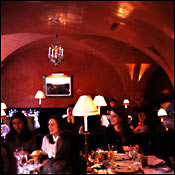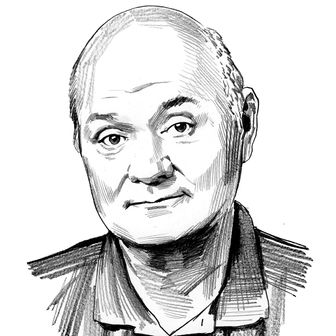
In the colorful panoply of New York high cuisine, all the great chefs have their roles. Mario Batali is Falstaff, the man of grand, unruly appetites; Jean-Georges Vongerichten is Pan, skipping magically between fusion and classical recipes; and Daniel Boulud is the punctilious maestro with the Midas touch. Then there is David Bouley, the cooking world’s version of Lord Byron, a romantic, temperamental figure with the occasional curious flaw. Bouley has been known to speed around town on a motorcycle and date Broadway stars (Bernadette Peters). He is regarded as a hero for his efforts feeding the relief workers in the wake of the September 11 tragedy, and as a scoundrel by some of his colleagues who accuse him of not paying his bills. To many members of the gastronomic elite, however, he remains a kind of poetic genius, a chef who, during the heyday of the original Bouley restaurant, was more inventive than Boulud, less showy than Jean-Georges, and less overpriced and snooty than the city’s latest culinary sensation, Alain Ducasse.
Which may explain why my normally verbose friend, the food aristocrat, seemed unusually pious as we sat down to dine at Bouley’s newly reconstituted restaurant, Bouley, in TriBeCa. “I think he’s a master,” she whispered in reverential tones, “to eat his food is such a thrilling opportunity.” In the wake of September 11, Bouley has closed down the bakery portion of his restaurant, lost or dismissed most of his former crack staff (many of whom left, according to reports, because their wages weren’t paid), and returned full-time to the kitchen after a five-year absence. The elegant main dining room has been expanded into the former bakery space, which is now decorated with lustrous oil paintings, low-slung chairs covered in red velvet, and lots of tall, frilly table lamps, like those you might find in an elaborate, Victorian-era train car.
Chef Bouley’s menu, at this relatively early stage (the restaurant reopened on February 9), looks elaborate, too. It’s chock-full of exotic tropical fruits (lobster with mango, salmon with green papaya), fanciful-sounding soups (Ocean Herbal Broth), and ornate sauces (tomato-lemongrass, Tahitian-vanilla). On one of my early visits, I sampled an appetizer called Return From Chiang Mai, an operatic mixture of lobster, artichokes, mango, and Serrano ham, arranged in dense, tasteful layers under a tangy orange dressing made with Thai curry. It shared the table with a cluster of other dishes: garlic-chestnut soup that tasted okay but had the thin, bubbly texture of bath water, a modest plate of grilled Japanese sardines (strangely paired with angel-hair pasta and a Parmesan crisp), and two snowy mounds of king-crab meat swimming, with asparagus, in a strangely tasteless parsley vinaigrette. The food aristocrat took a hesitant bite of this last dish, then put down her fork in quiet amazement. “It’s actually a little lugubrious,” she said.
One of the casualties of the post–September 11 shakeup was Galen Zamarra, Bouley Bakery’s supremely talented executive chef. In Zamarra’s absence, and while training a brand-new kitchen, Bouley seems to have returned, like a nostalgic rock icon, to his flashy, eighties-era roots. He soups up his recipes with fancy fusion ingredients and grasps, again and again, for crowd-pleasing combinations. My favorite of these was an appetizer of braised yellowtail tuna served in a milky, aromatic dressing made with ginger and tamarind. Other baroque seafood combinations worked less well: The salmon-and-green-papaya entrée – which included green apples, celery root, and diced zucchini – seemed a little inert. Ditto the lobster, which was ineffectually bombed with mangos when I sampled it for lunch, and served at dinner in a cramped bowl, muffled in blood oranges and an oversweet port-wine sauce.
Bouley’s mania for tropical, fusion flavors seems to work better with the bigger, more savory dishes. My friend the veal nut was pleased with her lunchtime portion of veal loin, which was dripped with Pinot-wine sauce and a deliciously rich confiture of glazed scallions, olive oil, and Japanese mushrooms. My favorite entrée of all was the duck, which was cut in soft, candied slices (they’re glazed with acacia honey) and set over a mound of wheat berries flavored with garlic chives and ginger. The rack of lamb was decent as lamb goes, despite being bathed in a brothlike substance called “zucchini mint sauce.” The venison fillets were properly gamy without being tough, and rolled on the outside with a tasteful dusting of black-trumpet mushrooms. For cholesterol hounds, there is a double portion of foie gras on the menu, one cold and spread between thin potato crisps (good), the other seared and served with quince purée (too sweet). There’s also a dish of Kobe beef, which was bland, meagerly portioned, and not worth the whopping price tag of $56.
Not that anyone at the packed restaurant seemed to notice. The return of Bouley is the big event in this spring’s culinary season, and on the evenings I was there, the two rooms buzzed with the kind of anticipatory chatter you hear at the opening of a long-awaited Broadway show. Even the food aristocrat kept up a polite, diplomatic patter until dessert, at which point she fell into a silent funk. I liked the palate-cleansing intermezzo (featuring bundles of mango ravioli stuffed with passion fruit) well enough, but my actual dessert – a pink rhubarb parfait – tasted a little chalky. There were several acceptable chocolate options, my favorite of which was a bitterly rich soufflé made with dark Valrhona chocolate. Delicate eaters can nibble at a dish of thinly shaved pineapple dappled with sugary mint leaves and a single scoop of sorbet. There’s also a standard rendition of crème brûlée, flavored with tea, and a rice pudding that tasted properly rich but not transcendent. But for now, not many items on the menu at the new Bouley seemed truly transcendent. Whether that’s disappointing depends, I suppose, on the extent to which one equates the cooking of food, at its highest level, to a kind of poetry. As an acolyte of the great Bouley, the food aristocrat was disappointed. Come to think of it, I was, too.
Bouley 120 West Broadway (212-964-2525); lunch, 11:30 a.m. to 3 p.m.; dinner, 5:30 to 11:30 p.m. daily. Appetizers, $12 to $18; entrées, $32 to $56. All major credit cards.
